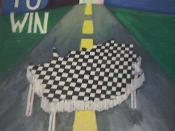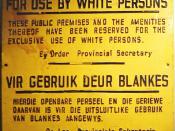Racial issues have always been a controversial component of society. Almost everyone has witnessed or experienced forms of discrimination in their lives. Lewis DeSoto attempts to convey a story of the repercussions society has on an individual. DeSoto's novel, A Blade of Grass, is the story of two young women of different races who struggle to survive in apartheid South Africa. DeSoto is able to accurately convey his message because he personally experienced the consequences of apartheid. DeSoto utilizes symbols to convey the many ongoing conflicts of the novel. DeSoto used the character of Marit to depict his message of conflict through various symbols in A Blade of Grass. The character of Marit is a representation of the author and mirrors the authors experiences. These experiences reflect the various events that occur through the novel and specifically the house symbolizes societal constitution. Society's influence on Marit and DeSoto is seen through the seeds as they symbolize the memories of Tembi, as she nurtures and grows them she recalls the outcomes of apartheid.
The author connects his memories to Tembi through the plantation of the seeds. One's life can be depicted through various symbols.
Conflict and segregation encompass Marit as she progresses through life. Lewis DeSoto constructed the character of Marit to exemplify his own experiences of conflict as he grew up in apartheid South Africa; a time of physical, political, and economic separation of the races. DeSoto was a caucasian of South Africa and ashamed of his background. He despised his South African heritage. The most profiecnet symbol of his nationality was his passport. Because of DeSoto hate towards his ethnic roots he detested his passport as it depicted him as a white oppressor. A term which he felt a tremendous amount of guilt towards because of his European- South African historical background.
"That passport marked me everywhere as an outsider, one of them, the white oppressors. I threw away my passport because I had already decided that I would never go back to South Africa. That act was a revocation of my citizenship; a declaration that I would never be associated with that country" (www.powell.com).
Lewis DeSoto opposed racial discrimination and did not support the idea of an enforced separation of the races, but yet he was discriminated against by the opposite race. Being judged by the opposite race by the colour of his skin he was isolated in society. The Africans did not accept him because of his cultural background, they stereotyped and rejected him from their society. He would not accept Caucasian society because of their mentality towards people of colour. DeSoto decided to separate himself from apartheid South African society when he immigrated across the ocean to Canada in 1967 at the age of sixteen to establish a new life. In his novel, A Blade of Grass, the protagonist, Marit Laurens is placed in a similar situation as the author himself. After getting married to her newly wed husband, Ben, Marit left Britain and moved to the remote Kudufontein farm in South Africa to bring Ben's dream of being a farmer to reality. Unfortunately, shortly after their arrival, her husband dies due to a land bomb accident and Merit is surprisingly determined to run the farm on her own. As the novel progressed, it was evident that Marit too did not support the apartheid ideology as she was shunned not only by the black citizens, but also by the neighboring white Afrikaner community who frowned upon her interracial friendship with Tembi. Marit did not like leaving her farm as she felt unwelcome when she left her property.
"If she crosses and continues walking how long before she reaches another country, the real frontier where there are rumors of war? She will not be welcome there, or in the country beyond that. In all the miles and acres of the hole continent It is only here on this side of the fence, behind the wire, that she belongs" (DeSoto, 35).
When DeSoto emigrated to Canada, he realized that Marit secluded herself from society a step further when she decided to change her appearance.
"Marit shakes out the folded cloth and wraps it around her midriff twice and up across her chest and ties two ends together in a firm knot. Her shoulders and her back are bare, like those of the women who work in the fields. She runs her fingers across the stubble of her hair, not much longer now than Tembi's" (DeSoto, 156).
As Marit knew she did not have any support from anybody and she was truly on her own, she decided to change her appearance as a symbol of her independence. It seemed as if Marit was trying to be Tembi, but her change of appearance marked the end of her life as a helpless foreigner trying to survive in an unknown world. Dressing like an African woman marked the beginning of a stronger and more determined Marit. Similarly, DeSoto isolated himself from his surrounding society and left South Africa to escape from his problems. As he wrote the novel about his homeland, he finally accepted his past and understood the actions of others do not define who you are and accepted the identity that he was embarrassed of.
The small farmhouse in the countryside in which Marit resides along with Tembi is a significant symbol in the story. The house can be seen to represent the society of South Africa, Africa, or the entire world. During a time of apartheid in South Africa, Merit and Tembi depend on each other for friendship and support even though they were of different races as they took refuge in the same house. Their friendship was depicted to be unbreakable as the two women faced obstacle after obstacle, yet it was fragile. After the death of her husband, Marit needed someone for support and Tembi took that role as she was recently orphaned after her mother's death. As well due to the isolation she faced by the other black workers because of her higher level of education. After the workers left, the two friends had only each other and the farm. Initially, Tembi recognized her position as the servant and treated Marit with a higher respect, but as the novel progressed, they both became more equal. "When their fragile friendship breaks down, the house becomes a battleground" (www.powell.com). When Marit and Tembi cooperate and they help each other out, they benefit as their environment as well as their minds are at a peaceful state. This is not always the case. Jealousy, power, and misunderstandings cause arguments that cause aggravating and pointless arguments that result unfavorable to both friends. This situation can be related to the problems of the world. When societies and countries are able to cooperate and intermingle amongst themselves, all is at peace and people are happy. Unfortunately, people tend to be hungry for power, which causes lots of conflicts. "This is not your place anymore. Before Marit can react, Khoza has grasped her by the arm and propelled her towards the door. He pulls is open and shoves her out" (DeSoto, 317). One problem is people trying to have control over certain situations , such as the case in A Blade of Grass in which Khoza and Tembi kick Marit out of her own house to show their power over her. This is ironic when compared to the history of colonialism in Africa. Europeans began colonizing in Africa as they exploited the many rich resources and the native people as many of them were forced to do hard labor in their own land and millions of others were exported as slaves around the world. Another issue of conflict that arises was the issue of apartheid; the separation of the races. "Because the color if the skin is different from hers. Everything is based on that distinction...Color is the marker - here on this farm, in this country, across the whole continent" (DeSoto, 29). There are many reasons why people separate themselves around the world and skin color is a primary excuse. The issue on skin color is repeatedly mentioned in the novel. The primary conflict Marit faced was a white woman living in apartheid South Africa. She was segregated by the blacks because of her white skin. Because of her friendship with Tembi, the white Afrikaner community had also isolated her.
The aspect of memories was an important theme in DeSoto's, A Blade of Grass.
DeSoto's South African passport reminded him of his past life as it was a link to apartheid South Africa. When he came to Canada to start a new life he disposed of it.
"I left South Africa in 1967, as a teenager, and yet 35 years later I can write a novel about that country precisely because memory and emotion are still alive, even though the 'facts; of my upbringing have long since faded away. When I threw away my passport I knew I was giving up my past as well as well as my home" (www.powell.com).
After thirty five years of leaving his past behind, the author still remembered the difficulties he endured when he was in South Africa. He had faced segregation from both the white community because of his beliefs against apartheid as well as from the black natives of Africa because his skin color was white. After apartheid had ended in South Africa Desoto was relieved to see that his home country had stopped abusing itself and had begun to prosper. To remind people of the difficult life of a person who believed in equality and acceptance during the apartheid era as he himself had endured. Thirty five years later, Desoto was blurred of the facts of history of South Africa, but he still distinctly remembered the emotions caused by history which he used to write his acclaimed novel, A Blade of Grass. In the novel, DeSoto conveys the memories of past conflicts through the symbolism of the seeds that begin as well as end the story. Tembi initially received the seeds, still in the fruit, as a gift from her father who was relocated to mine for gold in a far away city. "Already while eating the fruit, she has resolved to plant the seeds in some secret place, and nurture them, and bring forth sweetness out of the earth..."(DeSoto, 4) Tembi used the planted the seeds and used them as a memory of her past, before her father was relocated. It was a reminder of her family; her mother and father. She kept the seeds which, then grew into a plant, a secret. "For Tembi, life has been broken apart. The people she knew before the relocation are scattered. Ezulivini is no more. She is a stranger here" (DeSoto, 20). Her father was relocated and she knew would never see him again and her mother had just passed away. The only possession she had were the seeds that her father had sent to her from a faraway city called Johannesburg where he was relocated to mine for gold. As Tembi was segregated by both the blacks and the whites, the only thing she could always trust for comfort was the memory of her family, the seeds.
Overall, racial discrimination has always been a major factor in society, majority of the people have been impacted by it at one point or another and Desoto was one of those people. He has portrayed his many life experiences through A Blade of Grass using somewhat different circumstances. Through the use of the elements of symbolism, he has depicted the effect racial discrimination can have on individuals. Through the use of the different characters and situations in this novel, Desoto has reflected his background regarding the racial discrimination which he faced. Racism has always been a issue in society, but however over time it has altered in many ways but it is something that still needs to be addressed.


